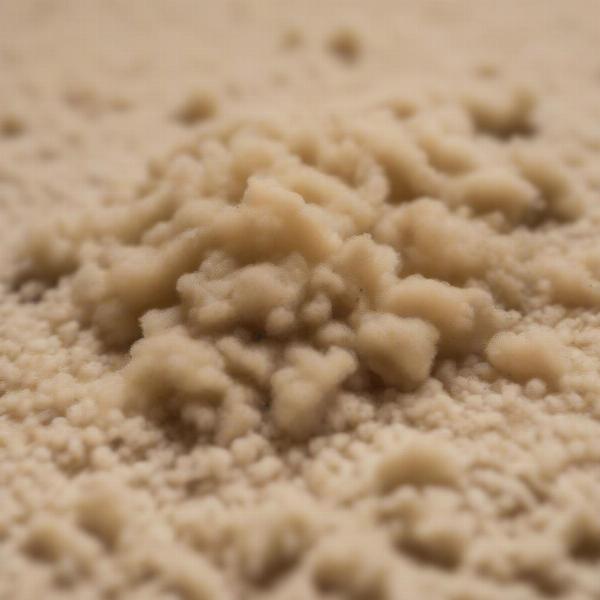Discovering dog vomit on your carpet is never pleasant. This unfortunate event can stem from a simple upset stomach to a more serious underlying health issue. Understanding why your dog is vomiting and knowing how to effectively clean and prevent future incidents is crucial for every dog owner.
 Chó nôn trên thảm
Chó nôn trên thảm
Why is My Dog Vomiting on the Carpet?
Several factors can lead to canine vomiting. Some common reasons include dietary indiscretion (eating something they shouldn’t), food allergies, infections, motion sickness, and even stress. Puppies are especially prone to vomiting due to their curious nature and tendency to ingest foreign objects. While an occasional vomit may not be cause for alarm, frequent or persistent vomiting warrants a visit to the veterinarian.
Identifying the Cause of Vomiting
Is your dog vomiting clear liquid? This could indicate gastritis. Is it bile-tinged and yellow? This may suggest an empty stomach or a blockage. Is the vomit bloody or contains undigested food? These could be signs of more serious issues like poisoning or a gastrointestinal obstruction. Keeping a close eye on your dog’s behavior, appetite, and the characteristics of the vomit can help your veterinarian determine the cause.
Cleaning Up Dog Vomit from Your Carpet
Swift action is essential to prevent staining and lingering odors. First, remove as much vomit as possible using paper towels or a disposable scoop. Next, blot the area with a clean cloth soaked in cool water. Avoid rubbing, as this can spread the stain and damage the carpet fibers.
Effective Cleaning Solutions
A mixture of baking soda and water can help neutralize odors and absorb remaining residue. Apply the paste to the affected area and let it dry completely before vacuuming. Enzyme-based cleaners are also effective in breaking down organic matter and eliminating odors. Always test any cleaning solution on a small, inconspicuous area of your carpet first to ensure it doesn’t cause discoloration.
Preventing Future Incidents
Preventing dog vomit on your carpet involves addressing the underlying causes. Feed your dog a high-quality diet appropriate for their age and breed. Avoid feeding table scraps or foods that are toxic to dogs, such as chocolate, grapes, and onions. Ensure your dog has access to fresh water at all times. If you suspect a food allergy, consult with your veterinarian about switching to a hypoallergenic diet. Regularly deworm your dog and keep their vaccinations up-to-date to prevent infections. For dogs prone to motion sickness, talk to your vet about anti-nausea medication before car rides. Finally, provide a stress-free environment for your dog, with plenty of exercise, mental stimulation, and a safe, comfortable space to relax.
How to Deal with Frequent Dog Vomiting?
If your dog vomits frequently, it’s essential to seek veterinary care. Persistent vomiting can lead to dehydration and electrolyte imbalances, which can be dangerous. Your veterinarian can perform diagnostic tests to determine the underlying cause and recommend appropriate treatment. Don’t delay seeking professional help if your dog’s vomiting is accompanied by other symptoms, such as lethargy, diarrhea, or loss of appetite.
Conclusion
Dealing with dog vomit on the carpet is an unpleasant but manageable task. By understanding the potential causes, cleaning the mess effectively, and taking preventative measures, you can keep your carpet clean and your dog healthy. Remember, persistent vomiting requires veterinary attention, so don’t hesitate to seek professional help if needed. Keeping a watchful eye on your dog’s overall health and behavior is key to ensuring their well-being.
FAQ
- What should I do if my dog vomits blood? Seek immediate veterinary attention, as this could indicate a serious medical condition.
- Is it normal for dogs to vomit occasionally? Occasional vomiting can be normal, but frequent vomiting is a cause for concern.
- How can I prevent my dog from eating things they shouldn’t? Supervise your dog closely, especially outdoors, and keep potentially harmful items out of their reach.
- What are some common household items that are toxic to dogs? Chocolate, grapes, raisins, onions, garlic, and xylitol (artificial sweetener) are just a few examples.
- How can I tell if my dog has a food allergy? Common signs of food allergies include vomiting, diarrhea, itchy skin, and ear infections. Consult with your veterinarian for diagnosis and treatment.
- Can stress cause vomiting in dogs? Yes, stress and anxiety can lead to vomiting in some dogs.
- What is the best way to clean dog vomit from a car seat? Similar to carpet cleaning, use paper towels to remove as much vomit as possible, then blot with a cool, damp cloth and use an enzyme-based cleaner to eliminate odors.
Related Articles
ILM Dog is a leading international dog care website dedicated to providing expert advice and resources for dog owners worldwide. We cover a range of topics, from breed selection and puppy care to senior dog health, training, nutrition, grooming, and product recommendations. Our mission is to empower dog owners with the knowledge and tools they need to provide the best possible care for their furry companions. For further assistance or inquiries, please contact us at [email protected] or call us at +44 20-3965-8624. Visit ILM Dog for more valuable information and resources on all aspects of dog care.